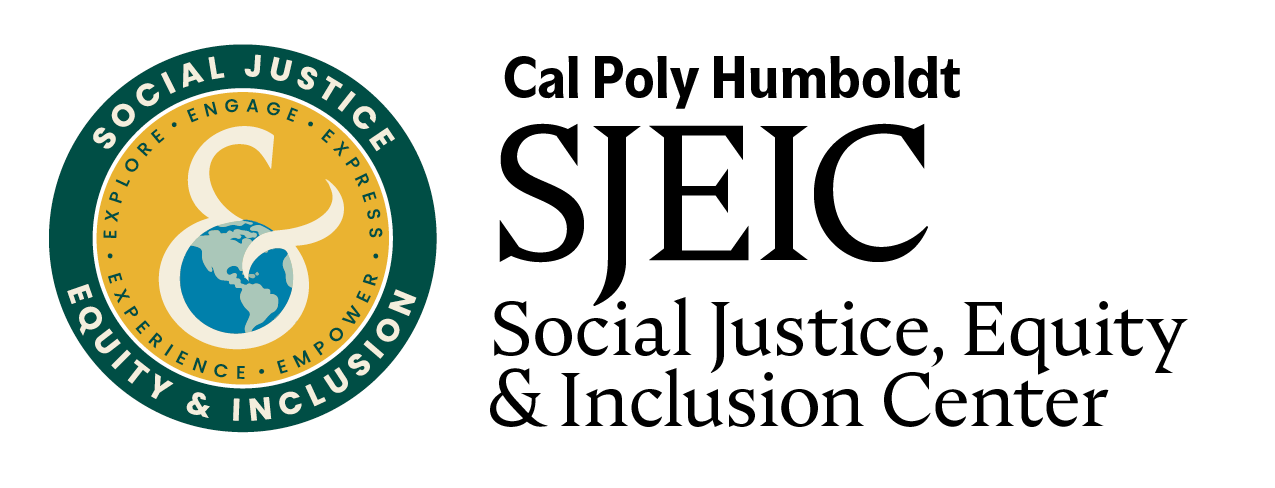Community Guidelines
Respect and honor people’s experiences
Be open to learning and unlearning
Share from experience using “I” statements”
Land & Labor Acknowledgements
Land Acknowledgement:
CWe acknowledge that Cal Poly Humboldt is located on the unceded lands of the Wiyot people, where they have resided from time immemorial. We encourage all to gain a deeper understanding of their history and thriving culture. As an expression of our gratitude, we are genuinely committed to developing trusting, reciprocal, and long-lasting partnerships with the Wiyot people as well as all our neighboring tribes.
Labor Acknowledgement:
We must acknowledge that much of what we know of this country today, including its culture, economic growth, and development throughout history and across time, has been made possible by the violent and coercive nature of exploitative and forced labor of Indigenous peoples, enslaved Africans, Chinese and Japanese immigrants, and migrant workers from the Philippines, Mexico, and Central and South America. We recognize and acknowledge our collective debt to their labor and their sacrifice. We must acknowledge the tremors of that violence that have been endured throughout the generations.The resulting impact can still be felt and witnessed as their labor continues to contribute to the wellbeing of our collective community.
We recognize that our economy continues to rely on the exploited labor of incarcerated people, largely people of color, who earn pennies an hour while generating billions in goods and services each year. We also recognize that our economy continues to rely on the coerced labor of women, gender non-conforming folks, and children who are forced into labor by cruel practices. Additionally, we recognize that there are numerous others who are prevented from reaping the true value of their labor as we exist in a society that values profit over people.
We commit to ensuring that our programs and services are delivered equitably by investing our money in goods and services provided by businesses owned and operated by these communities, while still aligning with the values set forward in this acknowledgement. We acknowledge that our position in this institution is a privilege and that we directly benefit from exploited, forced, and violent labor.
Zoom Guidelines
See original here: https://www.glsen.org/activity/guidelines-respectful-gsa-spaces
NO ASSUMPTIONS — EXCEPT FOR BEST INTENTIONS.
People should not assume other people’s experiences or anything else. The only assumption people should make is that when other participants speak, they are speaking with the best intentions and do not mean to offend anyone.
CORRECT GENTLY, BUT DO CORRECT.
If participants say something that is incorrect or offensive, politely address what was said. Letting comments slip by only makes the space less safe and increases the difficulty of building successful partnerships.
DON’T “YUCK MY YUM.”
When group members share their likes and dislikes, respect their personal opinions and preferences.
USE “I” STATEMENTS.
Everyone should speak from his/her/hir/their own experiences.
AVOID MAKING GENERALIZATIONS.
Don’t make blanket statements about any groups of people. (In addition to members of the LGBTQ community, this also includes political parties, religious groups, socioeconomic classes, age ranges, etc.) If you’re not sure that something you want to say is factually correct, phrase it as a question
ONE MIC, ONE VOICE.
Only one person should speak at a time.
MAKE SPACE, TAKE SPACE.
Participants should be aware of how much they are speaking. If they feel they are speaking a lot, they should let others speak, and if they find themselves not talking, they should try to contribute some comments, ideas or suggestions.
RESPECT CONFIDENTIALITY.
Assume that stories and comments shared at meetings/workshops should remain private. Ask for consent before you share someone’s story or comment.
LEAN INTO DISCOMFORT.
Meetings and topics can sometimes be challenging. Be willing to experience some discomfort in discussions, and learn from it as a community!
PERSONALIZE THESE AGREEMENTS!
This is a placeholder for us if we would like to add anything.
